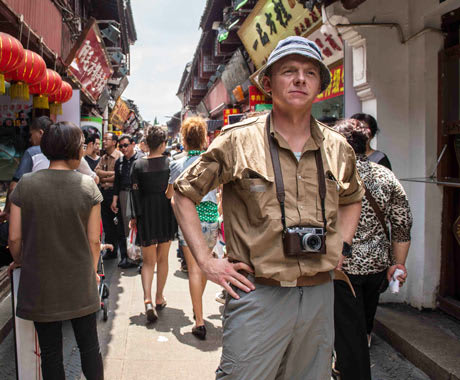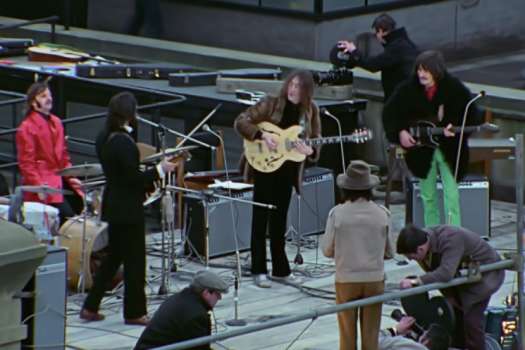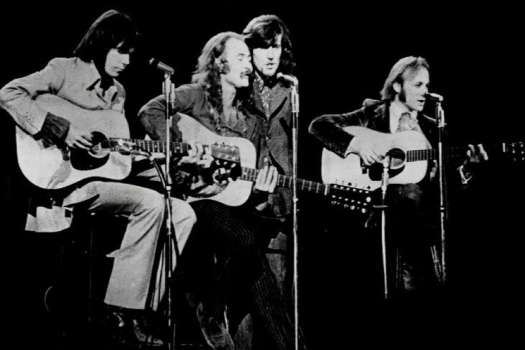My least favourite scene in Hector and the Search for Happiness has our man Hector drinking a beer in Africa while commenting on the high concentration of psychiatrists in rich cities, the suggestion being that existential angst and psychological bugaboos are problems reserved for privileged Westerners. It's a chestnut you've eaten before: impoverished, unmedicated third-worlders are connected, happy and grateful while miserable Westerners have industries to indulge their made-up problems. Somewhere in there is a point worth making, sure, but Hector, a shrink himself, is seemingly only realizing this while sipping his beer in the bush. In a chestnut-shell, this is what's wrong with this film. How the fuck is this guy a psychiatrist when the most obvious things about life elude him?
HATSFH concerns Hector (Simon Pegg), who looks like he has it all: a thriving practice, a loving, beautiful girlfriend (Rosamund Pike), and a series of neat routines that seem to make him happy. Except he's not happy, and his unhappiness compromises his ability to do his job properly. His solution is to travel the world, ostensibly to study what makes people happy. That said, his girlfriend gives him a Hall Pass before he goes, so maybe it's not only about professional growth.
When Hector leaves London, this film becomes truly annoying, because that's when it starts being Eat Pray Love with less depth.
Pretty much every important person Hector meets over the course of his journey is a road sign, a flat, two-dimensional character representing some kind of obvious thing. Stellan Skarsgård, for instance, plays a workaholic businessman for whom work is life, money buys happiness and happiness is expensive excess.
You know the rest without knowing the rest. There's the American doctor who runs a ramshackle African medical clinic; the drug kingpin who's unhappy because his wife is unhappy; the smiling dying lady who says that people who are afraid of death are afraid of life; the menacing gangster who says happiness is something to be taken; the family straight out of the pages of a Sub-Saharan casting catalog who are all about sweet potato stew, music and celebration; and lastly, the genial monk who, like the medicine man in Eat Pray Love, exists so that the white protagonist can check in with him for a belly rub after the moment of (obvious) enlightenment.
Later, Hector goes to see his old flame Agnes (Toni Collette) in L.A., and, through her, meets Christopher Plummer's Professor Coreman (i.e. the guy in the trailer who says we should busy ourselves with "the happiness of pursuit" instead of the inverse). Then and only then are we offered tangible proof of everything we already know: Hector, for all of Pegg's charm, is a man-child. The film's narrative lacks depth because Hector, as a man, lacks depth, which we already knew.
Supply is supposed to meet demand. I get that. But what I don't get is why we need yet another film about how man-children need to be dragged, kicking and screaming, into actual manhood. Shouldn't men as a group be embarrassed by this narrative by now?
(eOne)HATSFH concerns Hector (Simon Pegg), who looks like he has it all: a thriving practice, a loving, beautiful girlfriend (Rosamund Pike), and a series of neat routines that seem to make him happy. Except he's not happy, and his unhappiness compromises his ability to do his job properly. His solution is to travel the world, ostensibly to study what makes people happy. That said, his girlfriend gives him a Hall Pass before he goes, so maybe it's not only about professional growth.
When Hector leaves London, this film becomes truly annoying, because that's when it starts being Eat Pray Love with less depth.
Pretty much every important person Hector meets over the course of his journey is a road sign, a flat, two-dimensional character representing some kind of obvious thing. Stellan Skarsgård, for instance, plays a workaholic businessman for whom work is life, money buys happiness and happiness is expensive excess.
You know the rest without knowing the rest. There's the American doctor who runs a ramshackle African medical clinic; the drug kingpin who's unhappy because his wife is unhappy; the smiling dying lady who says that people who are afraid of death are afraid of life; the menacing gangster who says happiness is something to be taken; the family straight out of the pages of a Sub-Saharan casting catalog who are all about sweet potato stew, music and celebration; and lastly, the genial monk who, like the medicine man in Eat Pray Love, exists so that the white protagonist can check in with him for a belly rub after the moment of (obvious) enlightenment.
Later, Hector goes to see his old flame Agnes (Toni Collette) in L.A., and, through her, meets Christopher Plummer's Professor Coreman (i.e. the guy in the trailer who says we should busy ourselves with "the happiness of pursuit" instead of the inverse). Then and only then are we offered tangible proof of everything we already know: Hector, for all of Pegg's charm, is a man-child. The film's narrative lacks depth because Hector, as a man, lacks depth, which we already knew.
Supply is supposed to meet demand. I get that. But what I don't get is why we need yet another film about how man-children need to be dragged, kicking and screaming, into actual manhood. Shouldn't men as a group be embarrassed by this narrative by now?




